英语常用动词习惯用法
英语动词七种形式的用法

I. 动词原形的用法:1、除单三人称的一般现在时,其它人称作主语,动词用原形。
2、将来时态shall, will, should, would之后用动词原形。
3、祈使句句子开头用动词原形。
4、助动词do, does, did之后用动词原形。
5、情态动词can、could、may, might, have/has to, must, need, dare ,ought to之后用动词原形。
6、使役动词let、make、have 之后用动词原形。
7、感官动词see、watch、notice、hear、feel、find之后用动词原形(说明动作已经结束)。
8、had better 之后用动词原形。
9、why / why not 之后用动词原形。
10、would rather do sth . than do sth .11. prefer to do sth. rather than do sth./ prefer doing sth. to doing sth.12.help sb. do sth.II.动名词的用法:1.介词之后动词要用动名词形式(动词+ing)2.部分动词之后的动词只能用动名词形式:enjoy, finish, practice, mind, spend, dislike, find , keep3.部分短语后省略了介词in:have fun/ problems/ difficulties/ trouble /a good time doingbe busy doing , be worth doing , can’t help doing , feel like doing , do some doing sth.4.下面这些动词既可跟动名词又可跟不定式:like / love / hate doing (doing表示习惯)(to do表示具体的动作)stop doing(表示停止)(doing表示开始做不定式的动作);remember , forget (不定式表示未做;动名词表示已做);try (doing表示试着做;to do表示努力做);go on (doing继续做相同的事to do继续做不同的事) ;begin , start (to do与doing区别不大);need (人作主语用to do ;物作主语用doing表示被动);mean(人作主语用to do表示“打算做”;事/ 物作主语用doing表示“意味着”);5.这些动词既可跟动词原形,又可跟ing形式:see,watch,hear.notice(用原形是指动作结束,ing表示动作正在进行)6.go swimming/cleaning/fishing/skating/skiing….7.No parking/swimming/spitting…..8.do some cleaning/washing/reading…III.动词不定式的用法:1.ask/tell/want/order/teach/wish/would like/invite/encourage sb. to do sth.2.ask/tell/want/order/teach/wish/would like/invite/encourage sb. not to do sth.3.Help...(to) do sth. 4、主系表+ 不定式(to do)5.主系表+for sb + 不定式(to do)6.部分动词既可跟动名词又可跟不定式:(同动名词6)7.疑问词+不定式(to do)可以把复合句变为简单句,(to = 主语+will/would/can)IV.动词单三(动词+s / es)用于第三人称单数作主语的一般现在时态。
英语复习常用动词习惯用法
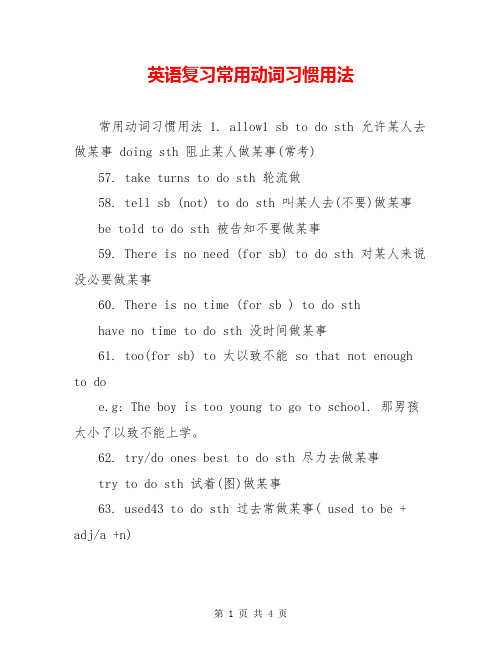
英语复习常用动词习惯用法常用动词习惯用法 1. allow1 sb to do sth 允许某人去做某事 doing sth 阻止某人做某事(常考)57. take turns to do sth 轮流做58. tell sb (not) to do sth 叫某人去(不要)做某事be told to do sth 被告知不要做某事59. There is no need (for sb) to do sth 对某人来说没必要做某事60. There is no time (for sb ) to do sthhave no time to do sth 没时间做某事61. too(for sb) to 太以致不能 so that not enough to doe.g: The boy is too young to go to school. 那男孩太小了以致不能上学。
62. try/do ones best to do sth 尽力去做某事try to do sth 试着(图)做某事63. used43 to do sth 过去常做某事( used to be + adj/a +n)e.g: Mr wang used to be a teacher worker. 王先生过去是一位工人。
I used to live in the country. 过去我住在农村。
64. want/would like to do sth 想做want/would like sb to do sth 想某人做feel like doing sth 喜爱做某事(注意like后接动词ing形式)65. warn44 sb (not) to do sth 警告某人做某事(或不要做某事)66. Why dont you do sthWhy not do sth ( 为什么不(表建议的句型,注意用动词原形) )表示建议的句型还有:What How about(如果是动词,要用ing形式)Shall we67. Would you like (sb) to do sth Yes, Id love to .68. Would you mind doing sth 你介意做某事吗Never mind/Not at all/of course45 not/certainlynot . (从不介意/一点也不介意/当然不会了)69. Would you please (not) do sth 你可不可以不做70. finish doing sth enjoy doing sth practise doing sth be good at doing sth be good at doing sth thank you for doing sth stop doing sth be good at doing sth give up doing sth mind doing sth stop sb from doing sth go on doing sth be busy doing sthsee/hear/watch sb doing sth feel like doing sth hate doing sth like doing sth do well in doing sth be afraid of doing sth be interested in doing sth make a contribution46 to sth/doing sth71. 非延续性动词(终止性动词)1.buy---have(has)had2.borrow---have(has)kept3.leave---have(has)been away4.go ---have(has)been away/ine ---have(has)here/in6.die47 ---have(has)been dead487.join---have(has)been a member of/in8.begin---have(has)on 8.stop---have(has)been overexample: 他的狗死了3天了.: His dog has been dead for three days. It is three days since49 his dogdied50. His dog died three days ago.72. 感官动词:(主动语态不带to)1.hear/see/watch sb do sth 或 2. hear/see/watch sb doing sth1. We often hear him sing the song.2. I saw51 him swimming in the river just now.被动语态带to:1. He is often heard to sing the song.役使动词: (主动语态不带to) make/let sb do sth.His father often makes him do this and that.被动语态带to:He is often made52 to do this and that by his father.。
初中英语常用动词习惯用法总结
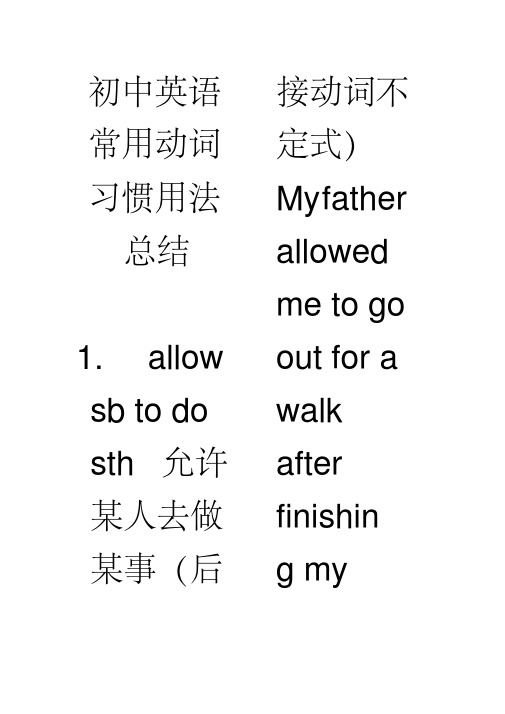
I am
was busy busy with
washing my work.
my car at 8. be
that time. coming/g
那时候我 oing/lea
正忙于清 ving/fiy
洗我的车 ing/movi
子。
ng/dying
(某些位
移动词用
进行时态 时表将 来) the bus is coming/t he dog is dying. 9. be excited to do sth
have a
afraid to
dinner
ask me
with them question
yesterday s.
.
4. be sth 害
afaid of 怕某物
doing sth He is
害怕做某 afraid of
事
snakes.
I am
6. be
afraid of amazedto
going out do sth
28.
29. get
让某人做 /have a
某事(后接 chance to
动词原形) do sth
get sb to 得到一个
do sth
做某事的
make 机会
sb do sth 30. giv
e/pass/s
how/lend /sell sb sth/sth to sb
ed in
We are
Chinese. ready for
13.
the exam.
be/get
Be ready
ready
to do sth
for/to do 为做某事
英语复习常用动词习惯用法

英语复习常用动词习惯用法常用动词习惯用法大家有知道的吗?如果没有,可以看小编总结的哦!接下来,小编给大家准备了英语复习常用动词习惯用法,欢迎大家参考与借鉴。
英语复习常用动词习惯用法常用动词习惯用法 1. allow1 sb to do sth 允许某人去做某事(后接动词不定式)My father allowed3 me to go out for a walk after finishing my homework.2. asked sb (not) to do sth 叫某人做事某事(叫某人不要去做某事)My father asked me to study hard.He asked me not to swim alone4.be asked to do sth 被叫去做某事/被邀请去做某事I was5 asked to have a dinner with them yesterday.3. be afraid to do sth 害怕做某事She is afraid to ask me questions.4. be afaid of doing sth 害怕做某事I am afraid of going6 out at night.5. be afaid of sth 害怕某物He is afraid of snakes.6. be amazed7 to do sth 对做某事感到惊讶He was amazed to meet the girl there.be amazed at sth 对某事感到惊讶they were amazed at the news8.7. be busy doing/with sth 忙于做某事(常考)e2.g: I was busy washing9 my car at that time. 那时候我正忙于清洗我的车子。
I am busy with my work.8. be coming/going/leaving/fiying/moving/dying10(某些位移动词用进行时态时表将来)the bus is coming/the dog is dying.9. be excited11 to do sth 对做……感到兴奋Jacky was excited to travel12 there by plane.be excited at sthLily13 was excited at his words.be excited about doing sthhe was excited about passing the exam14 without going overing books.10. be frightened15 to do sth 害怕去做某事Sam is frightened to ride a horse.11. be glad/happy to do sth 高兴去做某事she is happy to clean the blackboard with me.be pleased16 to do sth高兴做某事she was pleased to help the old man yesterday.be pleased with sth 对某事感到高兴/满意the teacher was pleased with my answer.12. be interested17 in sth/doing sth 对某事感兴趣/对做某事感兴趣she is interested in swimming in the river.My btother is interested in Chinese.13. be/get ready for/to do sthBe ready for sth 为某事做好了准备We are ready for the exam.Be ready to do sth 为做某事做好了准备We are ready to have a birthday party for her.get ready for sth为某事在做准备We are getting ready for the exam.get ready for sth 为做某事而做准备13. be sorry to do sth 对做某事感到抱歉14. be surprised18 to do sth 对做某事感到惊奇be surprised at sth 对某事感到惊奇15. be worth19 doing sth 值得做某事(worth 后接动词-ing形式,常考)16. begin to do sthbegin/start to do/doing sth ( 开始去做某事 )17. can/be able20 to afford21 (to buy) sth 有能力购买(供)……18. can/may/must do sth could/would22/should/might do sth19. can’t wait to do sth 迫不急待地去做某事20. decide23 to do sth 决定去做某事make up one’s mind24 to do sth 下决心去做某事(常考)make a decision25 to do sth 对做某事作出决定21. deserve26 to do sth 值得/应该做……22. encourage27 sb to do sth 鼓励某人去做某事23. enjoy doing sth 乐意去做某事24. expect28 (sb) to do sth 期望去做某事25. fail29 to do sth 做某事失败succeed30 doing sth 成功做了某事26. finish doing sth 做完某事(后接动词-ing形式)(常考)27. follow sb to do sth 跟随某人去做某事28. get sb to do sthmake sb do sthlet sb do sth (让某人做某事(后接动词原形))29. get/have a chance31 to do sth 得到一个做某事的机会30. give/pass/show/lend/sell sb sth/sth to sbbuy/get/bring sb sth/sth for sb31. go on to do sth 继续做事(常考)go on doing sth 继续做事(常考)32. hate32 to do/doing sth 讨厌/不喜欢做某事33. have fun doing sth34. have problems33 doing sth 做某事遇到困难35. have sb do sthhave sth donehave sth to do 工有事要做36. hear sb do sth 听到某人做某事(后接动词原形,常考)hear sb doing sth 听到某人正在做某事(常见)37. help to do sth 帮忙做某事help sb (to) do sth 帮助某人做某事38. hope/wish to do sth 希望做某事wish sb to do sth 希望某人做某事39. I t seems35 that 这像是……(后接从句)seem34 to do sthseem +adj40. It’s + adj+(for sb) to do sth .It’s+adj +(of sb) to do sthe.g: It’s glad for him to hear the news.41. It takes sb some time/money to do sth . 花费某人多长时间做某事(常考)42. pay36 …for… cost37 spend…on….. it take …to do sth43. It’s best for sb to do sth. 对某人来说做某事是最好的had38 better do sth 最好做某事(注意had没有时态和人称的变化,better后接动词原形)44. It’s time for sb to do sth 是某人做某事的时候了45. keep (on)doing sth 坚持做某事(常考)keep sb doing sth 让某人做某事(常考)keep sb from doing sth 阻止某人做某事(常考)keep sb/sth +adjkeep the book for 2 days 借这本书两天(不要用borrow或lend)46. learn to do sth 学做某事learn sth from sb 向某人学习47. like to do/doing sth 喜欢做某事like sb to do sth 喜欢某人做某事48. need to do sthneed doing sth/to be doneneed sth needn’t do sth(需要做某事)49. prefer39 to do sth rather40 than do sth 宁愿……而不愿……(常考)prefer doing sth to doing sth 喜欢做……胜过做……e.g: I prefer reading41 books to going shopping. 比起购物来,我更爱读书。
初一英语常见动词用法

初一英语常见动词用法在初一英语的学习中,动词是非常重要的一部分。
掌握常见动词的用法,对于我们正确理解和运用英语句子至关重要。
接下来,让我们一起了解一些初一英语中常见动词的用法。
一、be 动词(am/is/are)be 动词可以说是英语中最基础、最常用的动词之一了。
“am”用于第一人称单数“ I ”,例如:“I am a student ”(我是一名学生。
)“is”用于第三人称单数,比如:“He is tall ”(他很高。
)“She is my friend ”(她是我的朋友。
)“The book is interesting ”(这本书很有趣。
)“are”用于第二人称单数“you”以及复数人称,像:“You are nice ”(你很好。
)“We are happy ”(我们很开心。
)“They are in the classroom ”(他们在教室里。
)在使用 be 动词时,要注意主语的人称和单复数,保持一致。
二、have/has“have”表示“有”,用于第一人称(I、we)、第二人称(you)以及复数人称(they 等)。
例如:“I have a pen ”(我有一支笔。
)“They have many books ”(他们有很多书。
)“has”则用于第三人称单数(he、she、it),比如:“He has a dog ”(他有一只狗。
)“She has a beautiful dress ”(她有一条漂亮的裙子。
)三、like“like”意思是“喜欢”,常见的用法有:1、 like +名词,例如:“I like apples ”(我喜欢苹果。
)2、 like + doing sth ,表示喜欢做某事,强调习惯和爱好,比如:“He likes playing football ”(他喜欢踢足球。
)3、 like + to do sth ,表示偶尔或具体某次喜欢做某事,例如:“She likes to swim today ”(她今天喜欢游泳。
常用动词用法口诀

常用动词用法口诀动词是英语学习中的重要组成部分,掌握动词的用法对于学好英语至关重要。
下面为大家总结了一些常用动词的用法口诀,希望能帮助大家更轻松地理解和运用这些动词。
一、be 动词的用法我用 am,你用 are,is 连着他她它;单数名词用 is,复数名词全用 are。
变疑问,往前提,句末问号莫丢弃;变否定,更容易,be 后 not 莫忘记。
疑问否定任你变,句首大写莫迟疑。
比如:I am a student You are a teacher He is a doctor 当表示复数时,We are friends They are workers 要变成疑问句,Is she beautiful? Are they happy? 否定句则是:I am not tall They are not here二、have/has 的用法动词 have 表示“有”,位置就在主语后;“三单”主语用 has,其他人称用 have。
例如:I have a book He has a pen We have many friends 当主语是第三人称单数(he、she、it 或者单个的人名、地名等)时,用 has,其他情况用 have。
三、do/does 的用法do 与 does 来帮忙,动词原形跟着走;否定疑问靠它们,形式变化要记住。
主语若是三单式,does 出现动词原;其他人称都用 do,否定 don't/doesn't 加。
比如:I do my homework every day He does his work carefully 变成疑问句:Do you like music? Does she play the piano? 否定句:I don't like sports She doesn't go shopping on Sundays四、like 的用法like 动词真有趣,后面常把名词遇;动词 ing 也能跟,形式要看具体意。
英语单词惯用法(1)
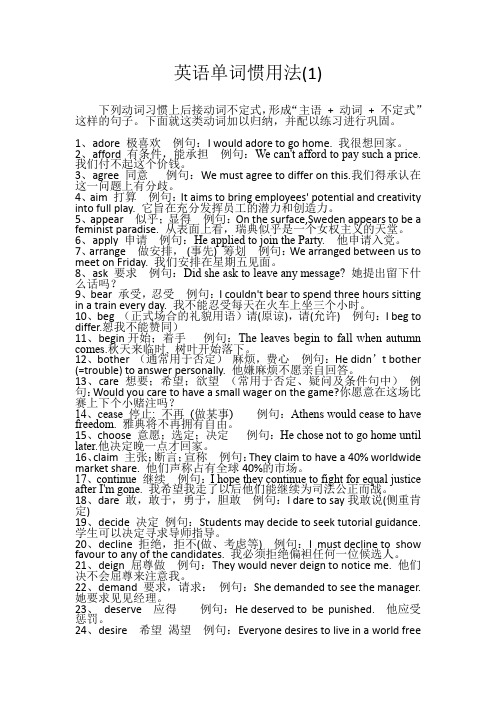
英语单词惯用法(1)下列动词习惯上后接动词不定式,形成“主语+ 动词+ 不定式”这样的句子。
下面就这类动词加以归纳,并配以练习进行巩固。
1、adore 极喜欢例句:I would adore to go home. 我很想回家。
2、afford 有条件,能承担例句:We can't afford to pay such a price.我们付不起这个价钱。
3、agree 同意例句:We must agree to differ on this.我们得承认在这一问题上有分歧。
4、aim 打算例句:It aims to bring employees' potential and creativity into full play. 它旨在充分发挥员工的潜力和创造力。
5、appear 似乎;显得例句:On the surface,Sweden appears to be a feminist paradise. 从表面上看,瑞典似乎是一个女权主义的天堂。
6、apply 申请例句:He applied to join the Party. 他申请入党。
7、arrange 做安排,(事先) 筹划例句:We arranged between us to meet on Friday. 我们安排在星期五见面。
8、ask 要求例句:Did she ask to leave any message? 她提出留下什么话吗?9、bear 承受,忍受例句:I couldn't bear to spend three hours sitting in a train every day. 我不能忍受每天在火车上坐三个小时。
10、beg (正式场合的礼貌用语)请(原谅),请(允许) 例句:I beg to differ.恕我不能赞同)11、begin开始;着手例句:The leaves begin to fall when autumn comes.秋天来临时, 树叶开始落下。
知识点初一常用动词用法总结

知识点初一常用动词用法总结初一常用动识点总结知识点1:动词的基本形式动词是一个句子中最主要的成分,用来表示动作或状态。
动词的基本形式指的是动词原形,常以动词原形作为主语、谓语或宾语。
知识点2:动词的时态动词的时态主要分为简单时态、进行时态和完成时态。
1. 简单时态a) 一般现在时:表示经常性、习惯性的动作或状态,常与副词always、often、usually等连用。
例句:I often go to the park on weekends.(我经常在周末去公园。
)b) 一般过去时:表示过去某个时间发生的动作或存在的状态。
例句:She watched a movie yesterday.(昨天她看了一部电影。
)c) 一般将来时:表示将来即将发生的动作或存在的状态。
例句:We will have a party next week.(下周我们将举办一场派对。
)2. 进行时态a) 现在进行时:表示现在正在进行的动作。
例句:She is playing basketball now.(她正在打篮球。
)b) 过去进行时:表示过去某个时间正在进行的动作。
例句:They were studying English at that time.(他们那时正在学习英语。
)c) 将来进行时:表示将来某个时间正在进行的动作。
例句:I will be sleeping when you arrive.(当你到达时,我将会正在睡觉。
)3. 完成时态a) 现在完成时:表示过去发生的动作对现在造成的影响或仍然持续的状态。
例句:He has finished his homework.(他已完成作业。
)b) 过去完成时:表示过去某个时间之前已经完成的动作。
例句:She had already left when I arrived.(当我到达时,她已经离开了。
)c) 将来完成时:表示将来某个时间之前已经完成的动作。
例句:I will have read the book by tomorrow.(到明天前,我将会读完这本书。
初中常见的动词的用法
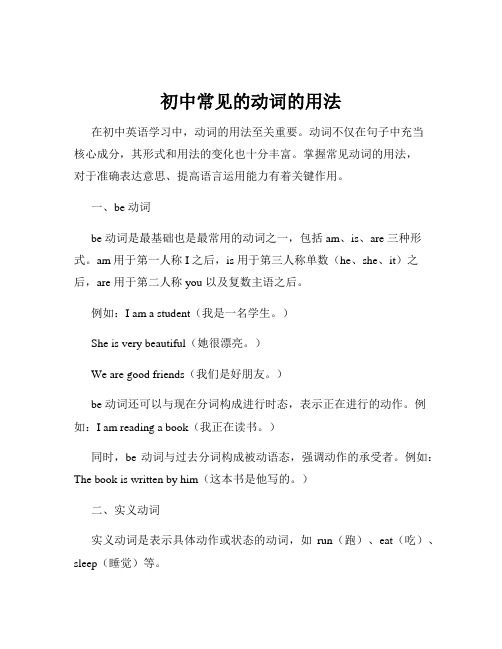
初中常见的动词的用法在初中英语学习中,动词的用法至关重要。
动词不仅在句子中充当核心成分,其形式和用法的变化也十分丰富。
掌握常见动词的用法,对于准确表达意思、提高语言运用能力有着关键作用。
一、be 动词be 动词是最基础也是最常用的动词之一,包括 am、is、are 三种形式。
am 用于第一人称 I 之后,is 用于第三人称单数(he、she、it)之后,are 用于第二人称 you 以及复数主语之后。
例如:I am a student(我是一名学生。
)She is very beautiful(她很漂亮。
)We are good friends(我们是好朋友。
)be 动词还可以与现在分词构成进行时态,表示正在进行的动作。
例如:I am reading a book(我正在读书。
)同时,be 动词与过去分词构成被动语态,强调动作的承受者。
例如:The book is written by him(这本书是他写的。
)二、实义动词实义动词是表示具体动作或状态的动词,如run(跑)、eat(吃)、sleep(睡觉)等。
1、及物动词与不及物动词及物动词后面必须接宾语,才能完整表达意思。
例如:I eat an apple(我吃一个苹果。
)“eat”是及物动词,“apple”是宾语。
不及物动词后面不需要接宾语就能表达完整的意思。
例如:Heruns fast(他跑得很快。
)“run”是不及物动词。
2、动词的时态一般现在时:表示经常发生的动作或存在的状态。
主语是第三人称单数时,动词要加“s”或“es”。
例如:He studies hard(他学习努力。
)一般过去时:表示过去发生的动作或存在的状态。
动词通常变为过去式,规则动词加“ed”,不规则动词有特殊的变化形式。
例如:I played basketball yesterday(我昨天打篮球了。
)现在进行时:表示正在进行的动作,由“be 动词+现在分词”构成。
例如:They are playing football now(他们现在正在踢足球。
英语常用词惯用法
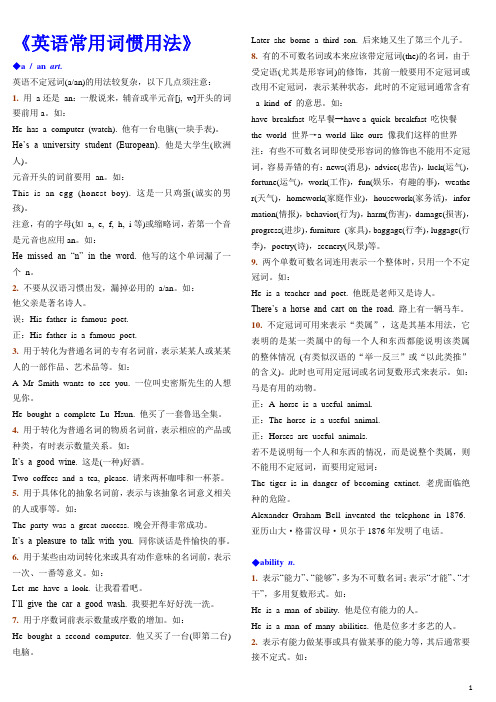
《英语常用词惯用法》◆a / an art.英语不定冠词(a/an)的用法较复杂,以下几点须注意:1.用a还是an:一般说来,辅音或半元音[j, w]开头的词要前用a。
如:He has a computer (watch). 他有一台电脑(一块手表)。
He’s a university student (European). 他是大学生(欧洲人)。
元音开头的词前要用an。
如:This is an egg (honest boy). 这是一只鸡蛋(诚实的男孩)。
注意,有的字母(如a, e, f, h, i等)或缩略词,若第一个音是元音也应用an。
如:He missed an “n” in the word. 他写的这个单词漏了一个n。
2.不要从汉语习惯出发,漏掉必用的a/an。
如:他父亲是著名诗人。
误:His father is famous poet.正:His father is a famous poet.3.用于转化为普通名词的专有名词前,表示某某人或某某人的一部作品、艺术品等。
如:A Mr Smith wants to see you. 一位叫史密斯先生的人想见你。
He bought a complete Lu Hsun.他买了一套鲁迅全集。
4.用于转化为普通名词的物质名词前,表示相应的产品或种类,有时表示数量关系。
如:It’s a good wine. 这是(一种)好酒。
Two coffees and a tea, please. 请来两杯咖啡和一杯茶。
5.用于具体化的抽象名词前,表示与该抽象名词意义相关的人或事等。
如:The party was a great success. 晚会开得非常成功。
It’s a pleasure to talk with you. 同你谈话是件愉快的事。
6.用于某些由动词转化来或具有动作意味的名词前,表示一次、一番等意义。
如:Let me have a look. 让我看看吧。
小学英语动词知识点总结

小学英语动词知识点总结一、动词的时态1. 现在时:表示当前的状态或习惯性的动作,有一般现在时、现在进行时和现在完成时。
eg: He lives in New York. (一般现在时)She is reading a book. (现在进行时)They have finished their homework. (现在完成时)2. 过去时:表示过去发生的动作或状态,有一般过去时、过去进行时和过去完成时。
eg: He worked in a factory last year. (一般过去时)She was washing her hands when I called her. (过去进行时)They had already left when we arrived. (过去完成时)3. 将来时:表示将要发生的动作或状态,有一般将来时和将来进行时。
eg: He will go to the park tomorrow. (一般将来时)She is going to visit her grandparents next weekend. (将来进行时)4. 现在完成时:表示过去某个时间点开始,一直持续到现在的动作或状态。
eg: I have lived in this city for ten years.5. 过去完成时:表示在过去某个时间点之前已经完成的动作或状态。
eg: They had studied English for three years before they went to the UK.6. 被动语态:表示主语是动作的接受者,而不是执行者。
eg: The car was repaired by the mechanic.二、动词的时态也会被表示方式:1. 一般式:表示一般的动作或状态。
eg: She plays the piano every evening.2. 进行式:表示正在进行的动作。
英语中的动词时态用法
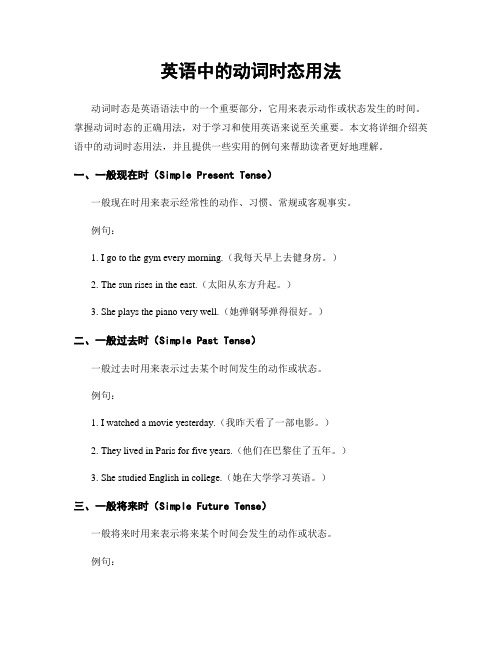
英语中的动词时态用法动词时态是英语语法中的一个重要部分,它用来表示动作或状态发生的时间。
掌握动词时态的正确用法,对于学习和使用英语来说至关重要。
本文将详细介绍英语中的动词时态用法,并且提供一些实用的例句来帮助读者更好地理解。
一、一般现在时(Simple Present Tense)一般现在时用来表示经常性的动作、习惯、常规或客观事实。
例句:1. I go to the gym every morning.(我每天早上去健身房。
)2. The sun rises in the east.(太阳从东方升起。
)3. She plays the piano very well.(她弹钢琴弹得很好。
)二、一般过去时(Simple Past Tense)一般过去时用来表示过去某个时间发生的动作或状态。
例句:1. I watched a movie yesterday.(我昨天看了一部电影。
)2. They lived in Paris for five years.(他们在巴黎住了五年。
)3. She studied English in college.(她在大学学习英语。
)三、一般将来时(Simple Future Tense)一般将来时用来表示将来某个时间会发生的动作或状态。
例句:1. I will visit my grandparents next week.(下周我会去看望我的祖父母。
)2. They are going to travel around the world.(他们打算环游世界。
)3. She is going to start a new job next month.(她下个月要开始一份新工作。
)四、现在进行时(Present Continuous Tense)现在进行时用来表示现在正在进行的动作。
例句:1. I am studying for my exams.(我正在为考试学习。
初中英语动词用法及

1.一般现在时(三人称单数动词加S,其他用动词原形)1)表示经常发生的习惯性的动作,常与often, always, usually, sometimes, every day等时间状语连用。
We go to school by bike every day. He always gets up very early.2)表示现在的特征或状态He is in Beijing now. Y ou look pale.3)表示客观事实或普遍真理Water boils at 100℃. The sun rises in the east.4)在时间和条件状语从句中表示将来的动作When I grow up, I’ll be a teacher.If you see him, will you tell him to come?5)表示按规定、计划或安排将要发生的动作,常用begin, go, come, leave, start, arrive等动词Tomorrow is Sunday. School begins next Monday.6)用于图表、戏剧、电影的说明,或体育比赛中迅速、短暂动作的解说Jim passes the ball to Bob. Bob shoots – fine shot!吉姆把球传给了鲍博,鲍博投篮,好球!2.现在进行时(be(is/ am /are)+现在分词构成)1)表示在说话的时刻或现阶段正在进行或正在发生的动作He is watching TV now.2)表示现在时间内动作有间断的延续活动She is translating a novel now.3)表示按计划或安排将要进行或发生的动作(限于go, come, stay, leave, start)He is going to Shanghai tomorrow afternoon.They are coming to see you tomorrow.4)表示一种尚未完结的渐变过程The boy is dying fast. 这个男孩快要死了。
英语动词时候用法

英语动词时候用法英语中动词有不同的时态形式,根据不同的情况和时态可以使用不同的动词时态。
下面是一些常用的英语动词时态用法:1. 一般现在时(Simple Present Tense):表示经常性的行为、习惯、真理或普遍事实。
例句:I go to school every day.(我每天去上学。
)2. 一般过去时(Simple Past Tense):表示过去一些时间或事情。
例句:She watched a movie last night.(昨晚她看了一部电影。
)3. 现在进行时(Present Continuous Tense):表示现在正在进行的动作。
例句:They are playing soccer in the park.(他们正在公园里踢足球。
)4. 过去进行时(Past Continuous Tense):表示过去一些时间正在进行的动作。
例句:We were studying for the exam yesterday.(昨天我们正在为考试复习。
)5. 现在完成时(Present Perfect Tense):表示过去一些时间发生的动作对现在造成的影响。
例句:I have finished my homework.(我已经完成了作业。
)6. 过去完成时(Past Perfect Tense):表示过去一些时间已经完成的动作。
例句:She had already left when I arrived.(我到达时她已经离开了。
)7. 将来时(Future Tense):表示将来会发生的动作。
例句:They will go to the beach tomorrow.(他们明天会去海滩。
)以上只是一些基本的动词时态用法,实际应用中还有更多不同的时态,如进行时态、完成进行时态等。
了解和熟练使用不同的动词时态可以帮助你准确地表达不同的动作在时间上的关系。
英语动词时态及用法详解

英语动词时态及用法详解英语动词时态是英语语法中的重要组成部分,它能够帮助我们准确地表达动作发生的时间和状态。
在这篇文章中,我们将详细探讨英语中常见的动词时态及其用法。
一、一般现在时一般现在时表示经常发生的动作、习惯性的行为、客观真理或普遍存在的情况。
其构成是主语+动词原形(当主语是第三人称单数时,动词要加“s”或“es”)。
例如:“I go to school every day”(我每天上学。
)“He likes playing football”(他喜欢踢足球。
)一般现在时常用于以下情况:1、表示日常习惯和规律,如“He gets up early every morning”(他每天早上都早起。
)2、表示客观事实和真理,例如“The earth moves around the sun”(地球绕着太阳转。
)3、表示永恒的状态,“Water boils at 100 degrees Celsius”(水在 100 摄氏度沸腾。
)二、一般过去时一般过去时表示过去某个时间发生的动作或存在的状态。
其构成是主语+动词的过去式。
比如:“I saw a movie yesterday”(我昨天看了一场电影。
)“She was happy last week”(她上周很开心。
)一般过去时的使用场景通常有:1、描述过去发生的一次性动作,“I met her at the party last night”(昨晚在派对上我遇见了她。
)2、讲述过去的习惯或状态,“When I was a child, I often played in the park”(当我还是个孩子的时候,我经常在公园玩。
)三、一般将来时一般将来时表示将来要发生的动作或存在的状态。
常见的构成方式有“will +动词原形”和“be going to +动词原形”。
像:“I will visit my grandparents next weekend”(下个周末我将去看望我的祖父母。
英语中的习惯用法

英语中的习惯用法★ 要点1.It’s the first time that……….(从句中用现在完成时)It was for the first time that………(强调句,对状语for the first time进行强调)It’s (high) time that……..(从句中用过去时或should do)2.It’s the same with sb. / So it is with sb.表示某人也如此(用于前句中既有肯定又有否定或两个不同类的谓语动词)3.…be about to do / be doing……when…….正要做/正在做……就在那时…….4 A is twice / three times as +原级+as BA is twice / three times the n. of B.A is twice / three times +比较级+than B5. It’s a waste of time / money doing / to do…It’s no use / good doing………It’s possible / probable / (un) likely that……….It makes great / no sense to do……做某事很有/没意义6. There’s no use / good doing…….There’s no sense / point (in) doing……There is no need for sth. / to do…….There is (no) possibility that…………(同位语从句)7.The+比较级…….., the+比较级………越…….., 越…….注意:前半句为从句,用一般现在时代替将来时;8. It seems / appears ( to sb. ) that sb…….在某人看来某人……….= Sb. seems / appears to be / to do / to be doing / to have done……..It seems / looks as if……….好象/似乎……..9.It (so) happened that sb. ……..某人碰巧……..= Sb. happened to be / to do / to be doing / to have done…..10.It is said / thought / believed / hoped / supposed …….that sb………=Sb. is said to be / to do / to be doing / to have done……….(注意:这种句型里如带动词hope则不能变成简单句,因为无hope sb. to do结构)12 …….such…….that…….如此…….以致于(引导结果状语从句)…….such……..as……像……..的这种……(as为关系代词,引导定语从句,在从句里充当主、宾、表)13. Do you mind if I do sth.? / Would you mind if I did sth.?14. The chance is that……../ (The )Chances are that……….很可能…….15.Check / Make sure / See to it / See that……..(从句中常用一般现在时) 确信/务必……..16. depend on it that……..取决于see to it that…….负责/设法做到…….注意:除了except / but / in等介词可以直接接that从句,其它介词后必须用it做形式宾语;17.It is / was +介词短语/ 从句/ 名词/代词等+that………How / When / Where / Why is / was it that………..?注意:此句型为强调句,当被强调的为表示人的词时,还可用who连接;强调主语时,从句后的谓语动词应与前面的主语保持一致;注意与定语从句的区别)18 .How is it that……..(这几个句型都表示“怎么会…….?” “怎么发生的?”)How come+从句?How does / did sth. come about? ( How did it come about that…….?)如:How come you are late again?19. There seems / appears / happens to be / must be / can’t be / is (are, was, were) said to be /is (are, was, were) thought to be…….表示 “.似乎有/碰巧有/一定有/不可能有/ 据说有/认为有……..”介词(如of )there beingwant / wish / expect there to be要/希望/期待有……..adj. / adv. enough for there to be…….足够…….会有…….注意:there being / there to be为there be的非谓语形式;It is said / thought that there is / are……=There is / was / are / were said (thought) to be……. 如:I have never dream of there being such a good chance for me.It won’t be cold enough for there to be a frost tonight.20. 疑问词+插入语+陈述语序?Who do you think he’ll have attend the meeting?21. But for + n. / pron., sb. / sth. would (not) have done…..要不是……., 某人早就……(表示虚拟语气)=If it had not been for…..,……./ If there had not been ……., ……..22. It won(’t) be long before +从句(从句中用一般现在时)不久/很久就要…….It was (not) long before+从句(从句中用一般过去时)不久/很久才……..23. Those who………….(从句及主句中谓语动词用复数形式).Anyone who…………= Whoever………..(从句及主句中谓语动词用单数形式) 24…….主句(一般现在时或过去时)…...when从句….(might / should do 或might / should have done) 表示”对比”,意思为“本该……(可)而却”,主句中为陈述语气,从句里为虚拟语气,如:Why are you here when you should be in school?你本该上学的怎么在这儿?He stopped trying when he might have succeeded .本该已成功了他却停止努力了.25. There is ./ Sb. have no doubt that………(同位语从句,that不可省略)There is / Sb. have some doubt whether……..(同位语从句不可用if)Sb. doubt if / whether…….Sb. don’t doubt that………26 . immediately / directly / instantly / the moment +从句on / upon + n. / doingNo sooner had sb. done than …….(过去时)Hardly had sb. done when……..(过去时)注意:这几个结构都表示“一…….就”;27. every time / each time / the last time / the first time / next time +从句(名词性短语引导一个时间状语句)anywhere / everywhere +从句(相当于wherever引导的地点状语从句)You can go anywhere you like.Next time you come, please bring your son along.28.If only / I wish +从句(用过去类时态) 表示虚拟语气, “要是…….就好了” “但愿……就好了!”29 .Considering + n. 或 pron. 或 that从句/ Seeing that……….考虑到/鉴于…….Given + n. / pron作状语,表示“在有……的情况下” “如果有” “假定”,有时也表示”考虑到”Seeing (that) he refused to help us, there is no reason why we should help him now.Given good health, I hope to finish the work this year.Given their inexperience / that they are inexperienced, they’ve done a good job.30.There was a time when…….曾经有那么一度……….31.other than与no, not, none等否定词连用,表示肯定意思,如:It was none other than Mr. Smith.这正是Smith先生.32. Not until…….did / do/ does / will sb. do……It was / is not until ……that sb………33.It’s (un) like sb. to do / to have done……做某事很像某人/ 做某事可不像某人34.It remains to be seen Wh--words ……..是否…….还有待于看.(不用that, if作连接词)35.It only remains for sb. to do……剩下的只是要某人做某事.We’ve got everything ready. It only remains for you to come to dinner.36.One moment……., and now………刚才一会儿还在做……而现在却……..37.Not all / both / everyone………表示部分否定38. Such is / are……..这(些)就是…….(谓语动词单复数由后面名词决定)39. I’d rather (not) do / have done……我宁愿…..I’d rather +从句(从句中用过去时或过去完成时)40. It’s important / necessary / strange / surprising….+that……(用陈述语气或should do)41. I like / hate / appreciate it that / when等从句 (it表示后面从句的这种情况)I appreciate it if you will give me a hand.42. By the time +从句(一般现在时/过去时),主句(将来完成时/过去完成时)43………., as is often the case with sb. / as is usual with sb.(as引导非限制性定语从句)44 in case / lest / for fear that…….(从句中用陈述语气或should do)45.While置于句首可表示As long as 或 AlthoughWhile there is life there is hope.While I admit his good points, I can see his bad ones.46. can not ( never) ……too +adj. (adv. ) / adj. (adv.) + enough “越……越好”“非常”too + adj. ( anxious / eager / willing / ready / glad等)+to do….表示肯定意思I can’t thank you enough.我非常感激你.He was too glad to see his father.=He was very glad to see his father.47. not / neve等表示否定的词与比较级连用表示最高级,如:-----Do you agree with his suggestion? -------I can’t agree more.48. What if……..要是…….怎么办?What if he doesn’t come tomorrow?49. more……..than与其…….不如……..He is more nervous than frightened.50. It is / has been +一段时间+since从句(从句中如为延续性动词,则实际表示的意思相反)It is two years since he drank.他不喝酒已两年了.★ :练习题Mr. Smith didn’t understand ______ made his son so upset this morning.A. what was itB. why it was thisC. how that wasD. what it was that-----Did you have a good sleep last night?----Yes, never sleep _______.A. badlyB. betterC. worseD. bestWe are only _____ glad to do anything we can _______ her.A.too; to helpB. very; help C too; help D. very; helping-----How come you are late for class again?-------_____________.A. Because I missed the busB. By bus and then on footC. Please excuse meD. It’s quite wrong_______more than 3,000 languages in the world.A. There are thought to beB. There is thought to beC. They are thought to beD. It is thought to be-----George is a wise person.-----But in my opinion, he is ______ than wise.A. clevererB. braverC. more braveD. less brave-----So can I ask you a few fairly straightforward questions about yourself?-----No problem. I like ________ when people are open and direct.A. thatB. thisC. itD. them----______I move the picture over here?----I suppose it’ll look better.A. How ifB. What aboutC. How aboutD. What ifChina has produced ______ this year as it did in 2002.A. as twice much steelB. twice steel as muchC. twice as much steelD. as much steel twice10.-----_______was it ______ you discovered the secret of his?------Totally by chance.A. How; whenB. What; thatC. What; whenD. How; that11.-----Who on earth could it be?------It was _______ other than Clint Eastwood.A. noneB. nothingC. notD. nobody12._____his age, he did it quite well, so don’t ______ him any more.A Given; blame B. Considered; say C. To regard; scold D. Considering; speak13.No sooner _____ themselves in their seats in the theatre ______ the curtain went up.A. they have settled; beforeB. had they settled; thanC. have they settled; whenD. they had settled; than14. -----Did you meet with the famous space hero, Yang Liwei?------______I had come here earlier!A. If onlyB. If notC. But forD. For fear15.The students expected __________ more reviewing classes before the final exams.A. it would beB. there beingC. it to beD. there to be16.Students shouldn’t be given so difficult a problem _____ they can not work out.A. thatB. whichC. whileD. as17. It was twelve o’clock at midnight _______ they arrived at a lonely village.A. thatB. beforeC. sinceD. when18.-----The exam wasn’t difficult, was it?------No, but I don’t think ______could pass it.A. somebodyB. anybodyC. everybodyD. nobody19.-----I always take care when doing papers on the computer.-----You meant it! One can not be _______careful working on it.A. tooB. veryC. soD. quite20.-----Is Miss White working these days?------No. It is two months since she worked here.------Oh,_____________?A. where is she working nowB. would you please show me the wayC. which is her officeD. is she ill。
英语惯用法10动词后接动名词

(4)表示“推迟”的动词
defer, delay, hold off, put off, postpone等
5)表示“停止”或“放弃”的
动词 Discontinue(停止), give up, leave off, quit, stop等。
(6)表示“承认”或“否认” 的动词: admit, acknowledge, confess, deny等。
Some music can purify people of their evil thoughts. The good news relieved us of our trouble. Please sweep the room of dust. 如:Education can disabuse people of their foolish ideas. 说明:sweep a place of sth ,也可以说sweep sth from a place
6.表示“耗尽”,“倒光”或“捞 光”的动词
deplete(用尽), drain(耗尽), empty(倒干), impoverish(耗 尽)。 如:The war drained the country of its wealth. They depleted their country of its natural resources.
5.表示“除掉”或“摆脱”的动词
cleanse(清除), clear (清除), disabuse(去掉), disburden(去 掉), disembarrass(使解脱), ease(去 掉,使安心), exorcise(清除), purify (清除), relieve(去掉), rid(去掉), sweep(扫掉)等。
英语单词惯用法(6)

英语单词惯用法(6)下面这些动词和短语习惯上后接“to+动名词”,形成固定的句式。
下面就这些动词和短语的用法加以归纳,并配以练习进行巩固。
1、adapt to doing sth 适应做某事例句:He has adapted to doing that work. 他已经适应做那件工作。
2、admit to doing sth承认做了某事例句:George would never admit to being wrong. 乔治从不认错。
3、amount 意思是做某事,等同于做某事例句:Borrowing money and not returning it amounts to stealing. 借了钱不还就等于偷。
4、apply oneself to doing sth专心致力于做某事例句:They applied themselves to producing bikes. 他们努力生产自行车。
5、apply to doing sth适用于做某事例句:These principles apply to learning maths. 这些原则适用于数学学习。
6、pay attention to doing sth注意做某事例句:Our teachers always pay attention to combining theory with practice. 我们的老师总是注意理论联系实际。
7、contribute to doing sth 促成/有助于做某事例句:Laissez-faire policy result in increase economic activity, but contribute to rising in import. 自由放任政策导致经济活动的增加,但也促进了进口的增长。
8、descend to doing sth 转而提到/堕落到做某事例句:All too soon they will descend to spreading scandal and gossip. 过不了多久他们就会堕落到传播丑闻和谣言的地步。
十类常见动词

十类常见动词(以及十个常用口语动词)一、表示“使/让……”概念的动词这类动词常见的有have,let,make,get,keep,drive,send,leave,force,cause等.它们后边分别可跟不定式,分词,形容词、介词短语,名词等作宾语补足语。
例如:I felt sorry to have kept you waiting for me so long.对不起,让你久等了。
The victory sent our spirits rising.胜利使得我们情绪高涨。
二、不定式做宾补,不定式符号可以省略的动词常见的有see,watch,hear,observe,feel,notice,listen to,look at等感官动词及表示使役概念的have,let,mak等。
这类词在变为被动语态时,其后不定式符号to通常要补出。
例如:We are made to work far into the night.我们被迫干活到深夜。
注:在这种结构中,watch,have,let一般不变为被动语态。
如: The boy was watched to come out。
(错误)三、不定式作宾语补足语、其后内容省略而只保留不定式符号的动词。
此类动词常见的有refuse,want,intend,oblige,mean,expect,tell,hope,like,love,plan, try, prefer,wish等。
例如:-----Why did you cause the baby cry?------I didn't mean to.四、引导宾语从句、虚拟预期的动词。
这类动词在引导宾语从句时为should+动词原形,should可以省略,这类动词有order,demend,suggest,insist,require,advise,decide,propose等。
例如:He orderd that we should do it at once.他要求我们立即完成这项工作。
- 1、下载文档前请自行甄别文档内容的完整性,平台不提供额外的编辑、内容补充、找答案等附加服务。
- 2、"仅部分预览"的文档,不可在线预览部分如存在完整性等问题,可反馈申请退款(可完整预览的文档不适用该条件!)。
- 3、如文档侵犯您的权益,请联系客服反馈,我们会尽快为您处理(人工客服工作时间:9:00-18:30)。
英语常用动词习惯用法1. allow sb to do sth 允许某人去做某事(后接动词不定式)My father allowed me to go out for a walk after finishing my homework.2.asked sb (not) to do sth 叫某人做事某事(叫某人不要去做某事)3.My father asked me to study hard. He asked me not to swim alone.be asked to do sth 被叫去做某事/被邀请去做某事 I was asked to have a dinner with them yesterday.3. be afraid to do sth 害怕做某事She is afraid to ask me questions.4. be afaid of doing sth 害怕做某事I am afraid of going out at night.5. be afaid of sth 害怕某物He is afraid of snakes.6. be amazed to do sth 对做某事感到惊讶He was amazed to meet the girl there.be amazed at sth 对某事感到惊讶They were amazed at the news.7. be busy doing/with sth 忙于做某事(常考)I was busy washing my car at that time. I am busy with my work.8. be coming/going/leaving/fiying/moving/dying(某些位移动词用进行时态时表将来)The bus is coming/the dog is dying.9. be excited to do sth 对做……感到兴奋Jacky was excited to travel there by plane.be excited at sth Lily was excited at his words.be excited about doing sth he was excited about passing the exam without going overing books.10. be frightened to do sth 害怕去做某事Sam is frightened to ride a horse.11. be glad/happy to do sth 高兴去做某事She is happy to clean the blackboard with me.be pleased to do sth高兴做某事She was pleased to help the old man yesterday.be pleased with sth 对某事感到高兴/满意 The teacher was pleased with my answer.12. be interested in sth/doing sth 对某事感兴趣/对做某事感兴趣She is interested in swimming in the river. My btother is interested in Chinese.13. be/get ready for/to do sthbe ready for sth 为某事做好了准备 We are ready for the exam.Be ready to do sth 为做某事做好了准备We are ready to have a birthday party for her.get ready for sth为某事在做准备We are getting ready for the exam.get ready for sth 为做某事而做准备13. be sorry to do sth 对做某事感到抱歉14. be surprised to do sth 对做某事感到惊奇be surprised at sth 对某事感到惊奇15. be worth doing sth 值得做某事(worth 后接动词-ing形式,常考)16. begin to do sthbegin/start to do/doing sth17. can/be able to afford (to buy) sth 有能力购买(供)……18. can/may/must do sth could/would/should/might do sth19. can’t wait to do sth迫不急待地去做某事20. decide to do sth 决定去做某事make up one’s mind to do sth下决心去做某事(常考)make a decision to do sth 对做某事作出决定21. deserve to do sth 值得/应该做……22. encourage sb to do sth 鼓励某人去做某事23. enjoy doing sth 乐意去做某事24. expect (sb) to do sth 期望去做某事25. fail to do sth 做某事失败succeed doing sth 成功做了某事26. finish doing sth 做完某事(后接动词-ing形式)(常考)27. follow sb to do sth 跟随某人去做某事28. get sb to do sth make sb do sth let sb do sth29. get/have a chance to do sth 得到一个做某事的机会30. give/pass/show/lend/sell sb sth/sth to sbbuy/get/bring sb sth/sth for sb31. go on to do sth 继续做事(常考)go on doing sth 继续做事(常考)32. hate to do/doing sth 讨厌/不喜欢做某事33. have fun doing sth34. have problems doing sth 做某事遇到困难35. have sb do sthhave sth donehave sth to do 有事要做36. hear sb do sth 听到某人做某事(后接动词原形,常考)hear sb doing sth 听到某人正在做某事(常见)37. help to do sth 帮忙做某事help sb (to) do sth 帮助某人做某事38. hope/wish to do sth 希望做某事wish sb to do sth 希望某人做某事39. I t seems that 这像是……(后接从句)seem to do sthseem +adj40. It’s + adj+(f or sb) to do sth .It’s+adj +(of sb) to do sth It’s glad for him to hear the news.41. It takes sb some time/money to do sth . 花费某人多长时间做某事(常考)42. pay …for…cost spend…on…..it take …to do sth43. It’s best for sb to do sth.对某人来说做某事是最好的had better do sth 最好做某事(注意had没有时态和人称的变化,better后接动词原形)44. It’s time for sb to do sth是某人做某事的时候了45. keep (on)doing sth 坚持做某事(常考)keep sb doing sth 让某人做某事(常考)keep sb from doing sth 阻止某人做某事(常考)keep sb/sth +adjkeep the book for 2 days 借这本书两天(不要用borrow或lend)46. learn to do sth 学做某事learn sth from sb 向某人学习47. like to do/doing sth 喜欢做某事like sb to do sth 喜欢某人做某事48. need to do sthneed doing sth/to be doneneed sth needn’t do sth49. prefer to do sth rather than do sth 宁愿……而不愿……(常考)prefer doing sth to doing sth 喜欢做……胜过做…… e.g: I prefer reading books to going shopping.prefer to do sth 喜欢(爱)做某事50. refuse to do sth 拒绝做……51. remember/forget to do sth 记得/忘记做某事remember/forget doing sth 记得/忘记做过某事52. see sb do sth 看见某人做某事(结果)see sb doing sth 看见某人正在做某事(正在进行中)be seen to do sth 做某事被看见53. something to eat/drink 一些吃/喝的东西(词不定式放在something等后修饰这些词)I need something to eat.54. spend some time (in)doing sth /on sth 花费时间做某事(注意动词要用ing形式)(常考)spend some money on sth/doing sth 买……花了多少钱55. Sth is hard/difficult/easy to do . 做好某事很难/容易56. stop to do sth 停下来去某事(两件事)(常考)stop doing sth 停止做某事(一件事)(常考)stop sb (from) doing sth 阻止某人做某事(常考)57. take turns to do sth 轮流做……58. tell sb (not) to do sth 叫某人去(不要)做某事be told to do sth 被告知不要做某事59. There is no need (for sb) to do sth 对某人来说没必要做某事60. There is no time (for sb ) to do sthhave no time to do sth 没时间做某事61. to o…(for sb) to …太……以致不能……so… that…not… enough to doe.g: The boy is too young to go to school. 那男孩太小了以致不能上学。
